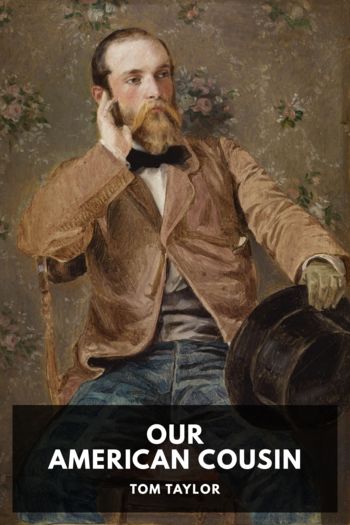Struggles and Triumphs, P. T. Barnum [good books to read in english .txt] 📗

- Author: P. T. Barnum
Book online «Struggles and Triumphs, P. T. Barnum [good books to read in english .txt] 📗». Author P. T. Barnum
My store had much to do in giving shape to my future character as well as career, in that it became a favorite resort; the theater of village talk, and the scene of many practical jokes. For any excess of the jocose element in my character, part of the blame must attach to my early surroundings as a village clerk and merchant. In that true resort of village wits and wags, the country store, fun, pure and simple, will be sure to find the surface. My Bethel store was the scene of many most amusing incidents, in some of which I was an immediate participant, though in many, of course, I was only a listener or spectator.
The following scene makes a chapter in the history of Connecticut, as the State was when “blue-laws” were something more than a dead letter. To swear in those days was according to custom, but contrary to law. A person from New York State, whom I will call Crofut, who was a frequent visitor at my store, was a man of property, and equally noted for his self-will and his really terrible profanity. One day he was in my little establishment engaged in conversation, when Nathan Seelye, Esq., one of our village justices of the peace, and a man of strict religious principles, came in, and hearing Crofut’s profane language he told him he considered it his duty to fine him one dollar for swearing.
Crofut responded immediately with an oath, that he did not care a d⸺n for the Connecticut blue-laws.
“That will make two dollars,” said Mr. Seelye.
This brought forth another oath.
“Three dollars,” said the sturdy justice.
Nothing but oaths were given in reply, until Esquire Seelye declared the damage to the Connecticut laws to amount to fifteen dollars.
Crofut took out a twenty-dollar bill, and handed it to the justice of the peace, with an oath.
“Sixteen dollars,” said Mr. Seelye, counting out four dollars to hand to Mr. Crofut, as his change.
“Oh, keep it, keep it,” said Crofut, “I don’t want any change, I’ll d⸺d soon swear out the balance.” He did so, after which he was more circumspect in his conversation, remarking that twenty dollars a day for swearing was about as much as he could stand.
On another occasion, a man arrested for assault and battery was to be tried before my grandfather; who was a justice of the peace. A young medical student named Newton, volunteered to defend the prisoner, and Mr. Couch, the grand-juryman, came to me and said that as the prisoner had engaged a pettifogger, the State ought to have someone to represent its interests and he would give me a dollar to present the case. I accepted the fee and proposition. The fame of the “eminent counsel” on both sides drew quite a crowd to hear the case. As for the case itself, it was useless to argue it, for the guilt of the prisoner was established by evidence of half a dozen witnesses. However, Newton was bound to display himself, and so, rising with much dignity, he addressed my grandfather with, “May it please the honorable court,” etc., proceeding with a mixture of poetry and invective against Couch, the grand-juryman whom he assumed to be the vindictive plaintiff in this case. After alluding to him as such for the twentieth time, my grandfather stopped Newton in the midst of his splendid peroration and informed him that Mr. Couch was not the plaintiff in the case.
“Not the plaintiff! Then may it please your honor I should like to know who is the plaintiff?” inquired Newton.
He was quietly informed that the State of Connecticut was the plaintiff, whereupon Newton dropped into his seat as if he had been shot. Thereupon, I rose with great confidence, and speaking from my notes, proceeded to show the guilt of the prisoner from the evidence; that there was no discrepancy in the testimony; that none of the witnesses had been impeached; that no defence had been offered; that I was astonished at the audacity of both counsel and prisoner in not pleading guilty at once; and then, soaring aloft on general principles, I began to look about for a safe place to alight, when my grandfather interrupted me with—
“Young man, will you have the kindness to inform the court which side you are pleading for—the plaintiff or the defendant?”
It was my turn to drop, which I did amid a shout of laughter from every corner of the courtroom. Newton, who had been very downcast, looked up with a broad grin and the two “eminent counsel” sneaked out of the room in company, while the prisoner was bound over to the next County Court for trial.
While my business in Bethel continued to increase beyond my expectations, I was also happy in believing that my suit with the fair tailoress, Charity Hallett, was duly progressing. Of all the young people with whom I associated in our parties, picnics, and sleigh-rides, she stood highest in my estimation and continued to improve upon acquaintance.
How I managed at one of our sleigh rides is worth narrating. My grandfather would, at any time, let me have a horse and sleigh, always excepting his new sleigh, the finest in the village, and a favorite horse called “Arabian.” I especially coveted this turnout for one of our parties, knowing that I could eclipse all my comrades, and so I asked grandfather if I could have “Arabian” and the new sleigh.
“Yes, if you have twenty dollars in your pocket,” was the reply.
I immediately showed the money, and,





Comments (0)